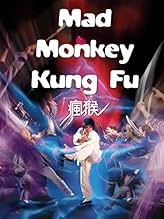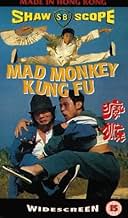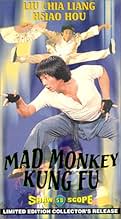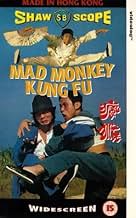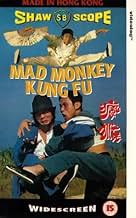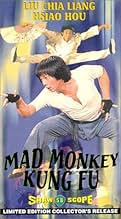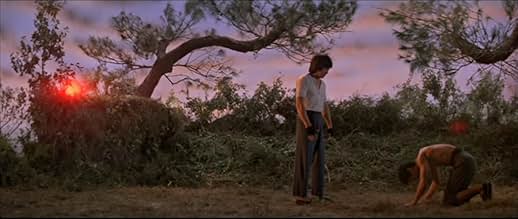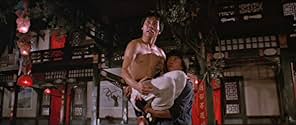ÉVALUATION IMDb
6,7/10
1,3 k
MA NOTE
Ajouter une intrigue dans votre langueA kung fu expert is tricked by a gangster into believing he has committed adultery, so his sister becomes a concubine, and his hands are damaged beyond repair. Years later, he teaches a stre... Tout lireA kung fu expert is tricked by a gangster into believing he has committed adultery, so his sister becomes a concubine, and his hands are damaged beyond repair. Years later, he teaches a street hustler Monkey Kung-Fu, and they take revenge.A kung fu expert is tricked by a gangster into believing he has committed adultery, so his sister becomes a concubine, and his hands are damaged beyond repair. Years later, he teaches a street hustler Monkey Kung-Fu, and they take revenge.
- Prix
- 1 nomination au total
Kara Ying Hung Wai
- Miss Chen
- (as Ying-Hung Hui)
Wing-Hon Cheung
- Green Dragon
- (as Yung-Han Chang)
Fung Ging-Man
- Stage Manager
- (as Ging-Man Fung)
Avis en vedette
Liu Chia-Liang or Lau Kar-Leung learned martial arts from his father who was a student of Lam Sai-Wing who was the number one student of Wong Fei-Hung. He learned fight choreography on the set of the early Wong Fei Hung movies starring Kwan Tak-Hing. I consider him to be the greatest man in the history of martial arts movies and dub him the Grandmaster.
A perfect martial arts movie is composed of these elements – real martial arts, Chinese opera, puppetry and storytelling. More specifically, those are the elements essential to a perfect fight sequence.
First element is real martial arts. This is obvious because the fight has to appear to be real. The individual moves have to actually work. However, the fight cannot be too real. Real fights are all the same and pretty much boring to watch. First the fighters throw a few moves from distance to close, then they fight in a clench, then they go to the ground. The audience gets bored starting at the clench.
Chinese opera keeps the fight from becoming boring. It adds an element of acrobatics that serves to keep the fight at a distance and thereby avoids the clench. Even if fighting close the action can keep going and even on the ground the elements of Chinese opera keep the fight interesting to watch instead of looking at two guys rolling around on the ground until they get tired.
China is also famous for puppetry. This element added the wire work to the fights. The actors could do gravity defying acrobatics and even the props could be controlled to follow specific paths of action.
The last element is storytelling and there is nothing specifically Chinese about it. In a good fight the viewer should be able to tell why these people are fighting and the story should be advanced by the fight. John Kreng calls this the art of non-verbal dialogue. This element is the most difficult and is often missed altogether but the greats like Liu Chia-Liang made some of the best movie ever by adding this element.
I consider these the Grandmaster's greatest movies, in chronological order: "Challenge of the Masters", "Executioners from Shaolin", "Heroes of the East", "The 36th Chamber of Shaolin", "Dirty Ho", "My Young Auntie", and "Legendary Weapons of China". I consider "Legendary Weapons of China" the greatest martial arts movie ever made and have reviewed it and rated it a perfect 10.
I am often asked "What was the best fight scene ever?" This question is really impossible to answer. It is totally subjective and how does one even define the qualities that make the best fight scene ever? Recently I began a project of watching every martial arts movie ever made in chronological order. I came to one conclusion from that effort. I believe absolutely that on May 7, 1976 (the release date of "Challenge of the Masters") the best fight scene ever filmed as of that day was the fight scene in that movie with Lia Chiu-Liang against his brother Lau Kar-Wing. The runner–up would be his fight against Gordon Liu in the same movie. Since then there are thousands of possible best fight scenes.
Where does "Mad Monkey Kung Fu" take its place in all this greatness? Off the list. It opens with Uncle Chan's downfall due to his character flaw of drinking. The circumstances are contrived and unbelievable yet presented as good entertainment so despite the stretch of believability it all works. The action for the first 48 minutes is minimal and the sequences short. Hsiao Ho gets on the ropes in the training sequence and kicks it up a notch. Greatness begins at about 1:02 minutes with the comedy fight against the protection gang and continues to the brothel. Another contrived and cliché scene this time involving eavesdropping) ties up the plot.
The final fight is back at the brothel and runs about ten minutes. It is really good yet many fight scenes in many movies were really good.
I like this movie and recommend it for anyone. Critically, though, it does not make the list of the Grandmaster's best movies.
A perfect martial arts movie is composed of these elements – real martial arts, Chinese opera, puppetry and storytelling. More specifically, those are the elements essential to a perfect fight sequence.
First element is real martial arts. This is obvious because the fight has to appear to be real. The individual moves have to actually work. However, the fight cannot be too real. Real fights are all the same and pretty much boring to watch. First the fighters throw a few moves from distance to close, then they fight in a clench, then they go to the ground. The audience gets bored starting at the clench.
Chinese opera keeps the fight from becoming boring. It adds an element of acrobatics that serves to keep the fight at a distance and thereby avoids the clench. Even if fighting close the action can keep going and even on the ground the elements of Chinese opera keep the fight interesting to watch instead of looking at two guys rolling around on the ground until they get tired.
China is also famous for puppetry. This element added the wire work to the fights. The actors could do gravity defying acrobatics and even the props could be controlled to follow specific paths of action.
The last element is storytelling and there is nothing specifically Chinese about it. In a good fight the viewer should be able to tell why these people are fighting and the story should be advanced by the fight. John Kreng calls this the art of non-verbal dialogue. This element is the most difficult and is often missed altogether but the greats like Liu Chia-Liang made some of the best movie ever by adding this element.
I consider these the Grandmaster's greatest movies, in chronological order: "Challenge of the Masters", "Executioners from Shaolin", "Heroes of the East", "The 36th Chamber of Shaolin", "Dirty Ho", "My Young Auntie", and "Legendary Weapons of China". I consider "Legendary Weapons of China" the greatest martial arts movie ever made and have reviewed it and rated it a perfect 10.
I am often asked "What was the best fight scene ever?" This question is really impossible to answer. It is totally subjective and how does one even define the qualities that make the best fight scene ever? Recently I began a project of watching every martial arts movie ever made in chronological order. I came to one conclusion from that effort. I believe absolutely that on May 7, 1976 (the release date of "Challenge of the Masters") the best fight scene ever filmed as of that day was the fight scene in that movie with Lia Chiu-Liang against his brother Lau Kar-Wing. The runner–up would be his fight against Gordon Liu in the same movie. Since then there are thousands of possible best fight scenes.
Where does "Mad Monkey Kung Fu" take its place in all this greatness? Off the list. It opens with Uncle Chan's downfall due to his character flaw of drinking. The circumstances are contrived and unbelievable yet presented as good entertainment so despite the stretch of believability it all works. The action for the first 48 minutes is minimal and the sequences short. Hsiao Ho gets on the ropes in the training sequence and kicks it up a notch. Greatness begins at about 1:02 minutes with the comedy fight against the protection gang and continues to the brothel. Another contrived and cliché scene this time involving eavesdropping) ties up the plot.
The final fight is back at the brothel and runs about ten minutes. It is really good yet many fight scenes in many movies were really good.
I like this movie and recommend it for anyone. Critically, though, it does not make the list of the Grandmaster's best movies.
This is a must see flick for any martial artist or just fan of the genre. Liang is the best director and choreographer of this time period.....probably still to date. Bruce Lee's fight choreography even pales when compared to Liang.
As a Bagua/Hsing-i instructor for over 20 years, I have witnessed many different levels of kung-fu expertise. 'Mad Monkey' is the best demonstration of footwork and kung-fu mastery that has ever been put on celluloid. Lui Liang's choreography and acting are first rate. As a viewer make sure to pay close attention to the demonstration of monkey style vs. all other 'hard' styles. In this demo., Liang shows how any martial artist should strive to become more and more loose/relaxed during a fight vs. what we are normally shown, which is the hero flexing his muscles and locking out into stiff poses for the camera. The story is gripping and the kung-fu is top notch, this is truly a martial masterpiece!
Smitten with the pretty sister of martial arts expert Chen (Lau Kar-leung/Liu Chia-Liang), evil gang-boss Tuan (Lo Lieh) does whatever it takes to make the woman his concubine: with some help from his equally scheming wife, Tuan frames Chen for rape, a crime punishable by drowning, but spares him this fate when Miss Chen (Kara Hui) declares that she is willing do whatever is necessary to save her brother's life. True to his word, Tuan allows Chen to go free, but not before making sure that the poor sap's hands are brutally crippled to ensure that he cannot seek retribution.
This being a traditional Shaw Brother's revenge tale, however, such dastardly deeds do not go unpunished: working as a street performer, Chen meets petty thief Little Monkey (Hou Hsiao) to whom he teaches the secrets of his powerful Monkey Fist kung fu (allowing for some really entertaining training scenes); after a few run-ins with local villains who have been causing trouble in town, Little Monkey confronts their boss, who—surprise, surprise—turns out to be none other than that scheming scoundrel Tuan! Major ass-kickery ensues...
It's been over twenty years since I first heard about this film from a friend, but I've only just gotten around to seeing it; if I had known at the time it was a Shaw Brothers production and that it starred HK cinema legends Lau Kar-leung and Lo Lieh I probably would have checked it out pronto, but alas, access to IMDb was still years away and I had no way of finding out any details about the film. Still, better late than never, and I'm glad to say that the wait was worth it: Mad Monkey Kung Fu is an excellent slice of old school fight action, a brilliant mix of expertly timed physical comedy and very impressive martial arts mayhem that, even at a massive 116 minutes long, never delivers a boring moment.
Monkey style always makes me laugh, what with all that comical twitching, scratching and screeching mid-fight, and this film sees Hou Hsiao giving it his all, acting the complete fool with ease whilst performing incredible acrobatics and dishing out some serious drubbings; Lau Kar-leung is just as impressive as his sifu, performing lightning fast moves and breath-taking somersaults; and Kara Hui also displays some impressive moves during her brief fight scene. Meanwhile, Lo Lieh proves why he is one of the finest baddies in the history of Hong Kong cinema, being utterly loathsome and simply begging for a bashing (which, of course, he duly receives before the final credits roll).
Take my advice, don't leave it two decades before YOU check out Mad Monkey Kung Fu!
This being a traditional Shaw Brother's revenge tale, however, such dastardly deeds do not go unpunished: working as a street performer, Chen meets petty thief Little Monkey (Hou Hsiao) to whom he teaches the secrets of his powerful Monkey Fist kung fu (allowing for some really entertaining training scenes); after a few run-ins with local villains who have been causing trouble in town, Little Monkey confronts their boss, who—surprise, surprise—turns out to be none other than that scheming scoundrel Tuan! Major ass-kickery ensues...
It's been over twenty years since I first heard about this film from a friend, but I've only just gotten around to seeing it; if I had known at the time it was a Shaw Brothers production and that it starred HK cinema legends Lau Kar-leung and Lo Lieh I probably would have checked it out pronto, but alas, access to IMDb was still years away and I had no way of finding out any details about the film. Still, better late than never, and I'm glad to say that the wait was worth it: Mad Monkey Kung Fu is an excellent slice of old school fight action, a brilliant mix of expertly timed physical comedy and very impressive martial arts mayhem that, even at a massive 116 minutes long, never delivers a boring moment.
Monkey style always makes me laugh, what with all that comical twitching, scratching and screeching mid-fight, and this film sees Hou Hsiao giving it his all, acting the complete fool with ease whilst performing incredible acrobatics and dishing out some serious drubbings; Lau Kar-leung is just as impressive as his sifu, performing lightning fast moves and breath-taking somersaults; and Kara Hui also displays some impressive moves during her brief fight scene. Meanwhile, Lo Lieh proves why he is one of the finest baddies in the history of Hong Kong cinema, being utterly loathsome and simply begging for a bashing (which, of course, he duly receives before the final credits roll).
Take my advice, don't leave it two decades before YOU check out Mad Monkey Kung Fu!
I generally dislike comedy in my kung fu, and prefer straight up revenge tales. Mad Monkey Kung Fu, strangely enough, combines both, but ultimately is more comedic than I would like.
That's not to say Chia-Liang Liu's direction isn't as good as ever, his choreographies mind-blowing and the kung fu on display impressive. My only gripe with the film, and the reason I largely didn't enjoy it, is that everything is utterly silly. I guess the monkey style kung fu is inherently silly, in and off itself, but Little Monkey's fights with Lo Lieh's thugs are more circus fare, complete with grimaces and silly quirks, than straight up kung fu.
What I DID like where the training scenes, where Master Chan trains Little Monkey (played over the top, and given his role, right on the money, by Hou Hsiao) in the ways of the monkey fu, . It's still very much played for laughs but pleasantly so.
Anyways, overall good performances by Hsiao, Lo Lieh and the foxy Kara Hiu (unfortunately in a short role), great choreographies as usual by Chia-Liang Liu, but too light-hearted for my tastes.
That's not to say Chia-Liang Liu's direction isn't as good as ever, his choreographies mind-blowing and the kung fu on display impressive. My only gripe with the film, and the reason I largely didn't enjoy it, is that everything is utterly silly. I guess the monkey style kung fu is inherently silly, in and off itself, but Little Monkey's fights with Lo Lieh's thugs are more circus fare, complete with grimaces and silly quirks, than straight up kung fu.
What I DID like where the training scenes, where Master Chan trains Little Monkey (played over the top, and given his role, right on the money, by Hou Hsiao) in the ways of the monkey fu, . It's still very much played for laughs but pleasantly so.
Anyways, overall good performances by Hsiao, Lo Lieh and the foxy Kara Hiu (unfortunately in a short role), great choreographies as usual by Chia-Liang Liu, but too light-hearted for my tastes.
Le saviez-vous
- Autres versionsThe 1995 UK video version is cut by 28 seconds.
- ConnexionsFeatured in 42nd Street Forever, Volume 5: The Alamo Drafthouse Edition (2009)
Meilleurs choix
Connectez-vous pour évaluer et surveiller les recommandations personnalisées
- How long is Mad Monkey Kung Fu?Propulsé par Alexa
Détails
Contribuer à cette page
Suggérer une modification ou ajouter du contenu manquant

